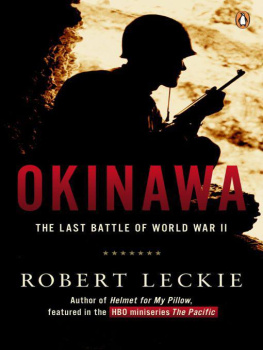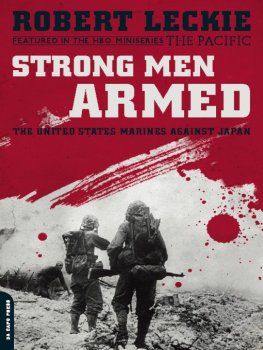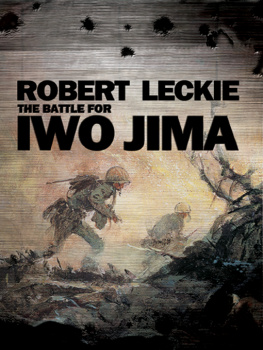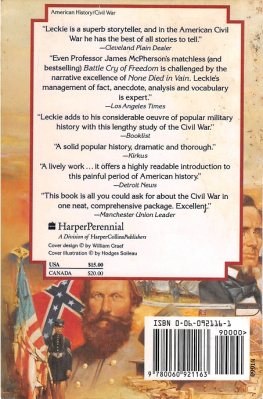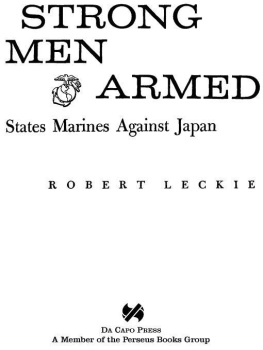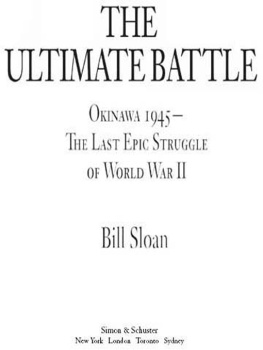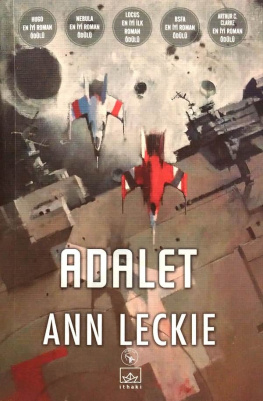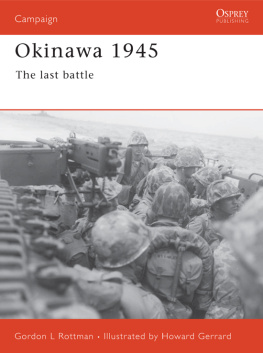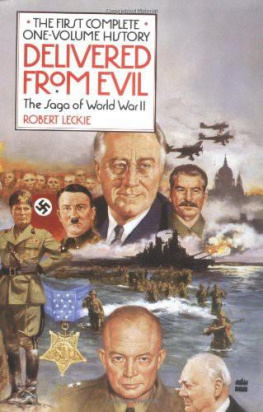Epilogue: The Value of Okinawa
CHAPTER TWENTY-FIVE
Truth trying to overtake falsehood is like the sound of an explosion seeking to catch up with the flash, and this seems to be especially true of that greatest myth of World War II: the belief that the atomic bombs dropped on Hiroshima and Nagasaki in early August 1945 compelled Japan to surrender.
There is no question that these dreadful fireballs ushering in the Age of the Mushroom Cloud had much to do with Emperor Hirohitos decision to order his Imperial Conference to accept the Allied surrender offer. But before they were droppedas has been suggested at the beginning of this narrativeJapan was already a defeated and demoralized nation, deeply divided between the diehards fiercely determined to continue the conflict regardless of the costs, and those timid members of the peace party who realized that the end had come but who still feared to risk the wrath of the firebrands. The atomic bombings, then, brought Hirohito to their side and encouraged them to defy the War Lords. But the fact remains that before then, before Okinawa, Japan was already beaten.
This was the conclusion of the most authoritative voice on the subject, the U.S. Strategic Bombing Survey created by President Harry Truman to assess the effects of Allied bombing in World War II. It declared: Based on a detailed investigation of surviving Japanese leaders involved, it is the Surveys opinion that certainly prior to 31st December, 1945, and in all probability prior to 1st November, 1945, Japan would have surrendered, even if the atomic bombs had not been dropped, even if Russia had not entered the war, even if no invasion had been planned or contemplated. No judgment could be more unequivocal. Why, then, were the bombs dropped?
Debate still rages over whether or not Japan should have been so ravaged. Harry Truman to his dying day insisted that he never had any doubt about the necessity of striking Nippon with atomic weapons. However, recent examination of his private papers produced a letter to his sister in which he wrote: It was a terrible decision. Some critics claim that Japan was chosen rather than Germany because it was an Oriental nationignoring the fact that the Nazis had been destroyed in May, two months before the Fat Boy on its tower at Alamogordo flashed upward with a light not of this worldor that the thickening mood of savage revenge that had seized the American public had to be satisfied. Apart from such emotional conclusions, it should be obvious that the atomic bomb kept Stalin out of Western Europe and forced him to walk softly in Asia. This was indeed a strategic consideration of the highest order, one that no sincere statesman could refuse to balance against the hideous loss of life and property that would ensue under the mushroom cloud; together with the certainty that American declarations of desiring peace and prosperity for all peoples would henceforth have to be read in the light of those terrible fireballs. Nevertheless, the atomic bombs did indeed keep the Soviet Union out of Western Europe and curtailed its ambitions in the Far East, even though they also presented the Soviets with a powerful psychological stick with which to beat the United States and its Free World allies.
To these considerations must be added the convictions of many high-ranking naval and air commandersnone of them members of the Joint Chiefs of Staffthat Japan could be bombed, shelled, and blockaded into submission. This is probably true, but can never be proved. At best such a policy would indubitably have saved many American lives, even though it would almost certainly have caused horrible and unimaginable suffering in Japan. Because it would have taken so much longer, it would have given the insatiably land-hungry Stalin the opportunity to enter the war for a much longer period than his actual six-day contribution, and thus cloak him in the customary mane of the lion roaring for his rightful share of the spoils. Hiroshima, then, did save Japan from the brutal and selfish policies of her War Lords determined that the nation must die like a dutiful Samurai. But Nagasaki was absolutely unnecessary, coming only three days after Hiroshima and thus too close to influence any decision. Probably it was dropped to show Japan that the United States possessed more than one bombactually it had only twoand presumably could produce many more.
From all this speculation only two probabilities seem to emerge: one, that Japan was already beaten and would have surrendered before the monster Operation Olympic invasion began three months later; two, that Harry Truman dropped both bombs as much to frighten Stalin as to finish off Japan.
Where, then, does this leave Okinawa?
A corollary of the myth of the atomic bombs is the other though less widespread misconception of Okinawa as an unnecessary battle. Here is one more instance of that cart-before-the-horse thinking common to those facile minds so well described by Aristotle: Contemplating little, they have no difficulty deciding. The Battle for Okinawa was begun on April 1, 1945, more than 4 months before the bombing of Hiroshima and 3 months before the first bomb was exploded at Alamogordo. The Americans wanted Okinawa for a staging area only 375 miles from Kyushu, the Japanese hoped through its kamikaze corps either to cripple or destroy the enemy sea power that had brought the Americans so close to Japan proper.
Because Imperial General Headquarters had not the slightest suspicion that the Americans were close to producing an atomic bomb, General Ushijima and his Thirty-second Army expected to defend Okinawa with conventional weapons, while General Buckner intended to seize the Great Loo Choo with the same instruments of war. Not until just before Hiroshima were Fleet Admiral Nimitz and General of the Armies MacArthurthe officers who would command the invasion of Japaninformed that their country now possessed atomic weapons. By then, of course, Okinawa had fallenand when it did, it so shocked Emperor Hirohito that he could echo what Fleet Admiral Osami Nagano, his personal naval advisor, had cried when he learned of the loss of Saipan: Hell is on us!
Until Okinawa, Hirohito had been an accomplice of the War Lords; if not a willing one, then, in the words of MacArthur, who came to know him better than any other Westerner: a figurehead, but not quite a stooge. After its fall, he was ready to challenge them, and the atomic bombs gave him that opportunity.
So Okinawa was indeed decisive, for if the Japanese had won in this biggest battle of the Pacific War, the hold of the War Lords upon the nation of Nippon would have been so strengthened that even the influence of Hirohito could not have persuaded the Imperial Conference to accept the Allied surrender offer. Thus, the war would have been prolongedhopelessly for Japan, of courseand only the production and use of more atomic bombs would have avoided that titanic clash of arms upon the Tokyo Plain.
Why Okinawa?
CHAPTER ONE
On September 29, 1944, Fleet Admiral Chester Nimitz, commander of the Pacific Ocean Area (POA), and Fleet Admiral Ernest King, chief of U.S. Naval Operations, conferred in San Francisco on the next steps to be taken to deliver the final crusher to a staggering Japan. This was the conferences stated purpose, but the unspoken objective was to persuade the irascible, often-inflexible King to accept Nimitzs battle plan, instead of Kings own.
This would not be easy, for the tall, lean, hard, humorless King was known to be so tough he shaves with a blowtorch. Indeed, his civilian chief, Secretary of the Navy Frank Knox, had ordered from Tiffanys a silver miniature blowtorch with that inscription on it. Thus, there was some trepidation among Nimitz and his Army chiefsLieutenant General Simon Bolivar Buckner of Army Ground Forces (POA) and Lieutenant General Millard Harmon of the newly formed Army Air Forces (POA)as well as Admiral Raymond Spruance, alternate chief with Fleet Admiral William Bull Halsey, of Nimitzs battle fleet. They knew that King was convinced the next operation in the Pacific should be landings on the big island of Formosa off the Chinese southeastern coast. If Nimitz and staff could persuade King to accept General of the Armies Douglas MacArthurs plan to invade Luzon in the Philippines rather than Formosa, the conference would end in a rare and high note of interservice cooperation.

